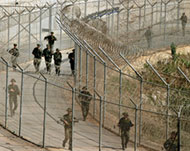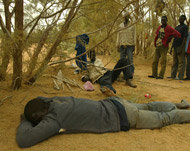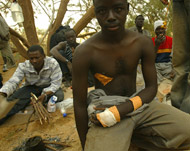Morocco to return African immigrants
Hundreds of sub-Saharan African immigrants face repatriation after being stranded almost a week in the Moroccan desert, having tried to reach Europe through Spain’s tiny North African enclaves, aid sources say.

Along the Moroccan-Algerian border, 60km from the Moroccan town of El Aouina-Souatar, several among the bedraggled group said it was their dream to reach Melilla, one of Spain’s two enclaves in Morocco.
As the migrants prepared for another night in the desert without food and water, medical charity Medecins sans Frontiers (Doctors Without Borders – MSF), whose team on the ground discovered the group on Friday, said the Moroccan authorities were set to repatriate them on Sunday.
MSF had estimated the group to number more than 500 people.
Air passage secured
Aljazeera’s correspondent in Morocco reports that the International Organisation for Migration (IOM) and the Red Crescent have secured air passage between the Moroccan border town of Oujda and the migrants’ countries south of the Sahara desert.
 |
|
Forces patrol the fence at one of |
The first aircraft will carry about 400 migrants back to Senegal, reports Iqbal Elhami.
Eleven migrants have been killed while trying to cross via Spanish borders.
The migrants have no shelter, food or drink, the reporter added.
MSF sources were quoted as saying the Moroccan authorities had picked them up and were taking them by bus and truck to Oujda with the intention of repatriating them by plane.
The MSF sources, under regional coordinator Carlos Ugarte, said they hoped to accompany the immigrants to their planes to ensure their security.
Dumped in desert
The migrants, mostly from Mali, Cameroon, Congo, Gambia, Guinea, Ivory Coast, Nigeria and Senegal, said earlier that Moroccan security forces had driven them deep into the desert by bus, one night almost a week ago, and left them to their fate.
“We just want to go home,” cried Guy-Rostand Tembon, a 33-year-old from Cameroon.
 |
|
The immigrants have been left |
“The Moroccans marched us off buses at night, some 20km from the Algerian border.
“They hit us, women and youngsters were attacked. Then we walked towards the border – but the Algerians were waiting for us with guns trained on us.
“We are desperate. Please do something for us.”
Repatriation accord
Melilla and twin enclave Ceuta, Spanish and hence European territory on Morocco’s north coast, have in recent weeks been stormed by waves of would-be immigrants, hundreds of whom managed to cross the enclaves’ high barriers.
But Spain, which has sent in regular army troops to reinforce border guards in the enclaves, on Saturday sent back about 100 of those who had got through.
The immigrants were flown handcuffed to Malaga in southern Spain, from where they were due to be sent back to Morocco by boat.
On Thursday, Spain had expelled 73 would-be immigrants from Melilla to Morocco in line with a 1992 repatriation accord, until now rarely applied.
Rabat insists it is careful to respect human dignity when tackling illegal immigration, in line with a demand on Friday by UN Secretary-General Kofi Annan.
Desperation
However, AFP’s photographer on the Morocco-Algeria border reported that the hundreds of destitute people there, including children and pregnant women, were being left to their fate.
 |
|
An man shows injuries he says |
“We’re in a hole – we don’t know where to go. The women are sick. Algeria refuses to let us in and the first town of Oujda is 500km away,” 31-year-old Malian Kone Siaka said.
“For pity’s sake call the UN, the OAU [Organisation of African Unity, now the African Union], the European Union. We’re going to die.”
Three Guineans suffering from malaria were lying on the sand.
“They’re not moving any more. I’d say they’re dying,” the AFP photographer said.
Foujemi Fadiga, a 21-year-old Malian, showed two bullet wounds, one in the lower chest, the other in the right leg.
“When the Moroccans saw us get off the bus, they hit out at us and opened fire. I was hit,” said Fadiga.
Racism alleged
Another Malian said the Spanish had expelled some of them, shouting racist epithets.
|
“For pity’s sake call the UN, the OAU (now the African Union), the European Union. We’re going to die” Kone Siaka, |
In Rabat, Moroccan government spokesman and Communications Minister Nabil Benabdellah insisted Morocco had behaved properly.
“Morocco is careful to respect human dignity in the fight against clandestine immigration and acts in strict observance of international norms,” he said, expressing surprise at the growing criticism of Moroccan tactics.
“Morocco itself is a victim of this illicit immigration and our neighbour Algeria should also take some responsibility,” he said.